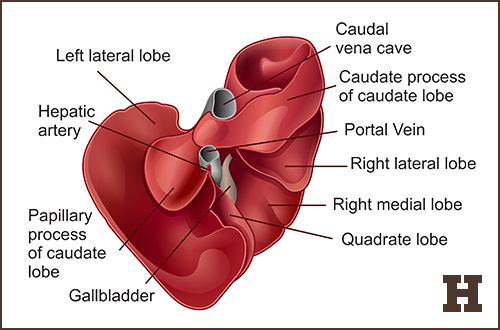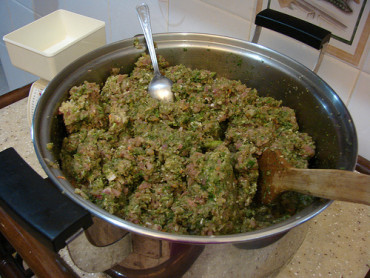Understanding and Successfully Treating Liver Disease in Dogs
The liver is a vital organ and has many different complex functions from detoxing the blood, to bile production aiding in digestion. As a result, liver disease in dogs can manifest itself in a number of different ways depending on the function of the liver that is affected. It can often affect other system and organs in the body making for a complicated situation.
The liver is at the frontline of fighting against many diseases because of its role in metabolizing, detoxifying, and storing various toxic compounds. This makes it both increasingly susceptible to disease as well as playing an extremely important role in combating it.
 Chemicals such as pesticides and herbicides can build up damaging the liver, compromising its ability to function properly.
Chemicals such as pesticides and herbicides can build up damaging the liver, compromising its ability to function properly.
Jaundice is a common type of liver disease and occurs when the ability to excreting bilirubin, a byproduct of red blood cell breakdown is diminished. The bilirubin then begins to build up in the blood and leads to the yellowish appearance of the patient. This can be apparent in the skin, gums, eyes and ears.
Hepatic encephalopathy is another commons syndrome of neurologic problems caused by poor liver function. It refers to the neurological disorders that occur as the result the liver’s inability to remove toxins from the bloodstream. Seizures, disorientation, blindness, loss of balance, head pressing and personality changes.
Treatments may include enemas to cleanse the intestines of ammonia and other poisons, as well as to introduce nutrients that help decrease poison production.
Other common symptoms of liver disease are gastrointestinal signs, such as decreased appetite, vomiting, diarrhea, weight loss, increased drinking and urination, and changes in stool color.
Dogs may also develop fluid retention in the abdomen, referred to as ascites. In patients with liver disease, ascites is caused by a combination of high blood pressure in the liver and an imbalance in sodium and water metabolism. The first step in the control of ascites is restriction of sodium in the dog’s diet. However, sodium-restricted diets alone are often not sufficient, and diuretics may also be needed to help promote fluid loss.
 Early treatment is critical for dogs with acute liver failure. A variety of blood tests can be useful in detecting and diagnosing liver disease.
Early treatment is critical for dogs with acute liver failure. A variety of blood tests can be useful in detecting and diagnosing liver disease.
Additional Complications
Clotting problems can arise and may be treated using transfusions of blood or plasma to provide the necessary clotting factors. Heparin and vitamin K can also be administered to aid in clotting.
Main Causes for Liver Failure in Dogs
There are a number of different factors in the development of liver disease in dogs. Poor flow of fluids into the liver and surrounding tissues is a common characteristic. Because the liver functions as a filter, it comes into contact with many different toxins that need to be flushed out to avoid build up. Certain plants and herbs such as ragwort as well as particular mushrooms and blue green algae can have adverse affects on the liver. Medications over an extended time can also challenge the liver leading to complications and disease.
Processed dog foods are often considered a contributing factor in many diseases especially regarding the digestive tract. Many dry dog foods are not only a challenge to the immune system, but they also tend to dehydrate the digestive tract and fail to properly flush out toxins and other contaminants. This increases the strain on the liver and can lead to complications and even failure over time.
 Dry dog foods actually dehydrate the digestive tract and fail to properly flush out contaminants and pollutants from the intestines and bladder.
Dry dog foods actually dehydrate the digestive tract and fail to properly flush out contaminants and pollutants from the intestines and bladder.
Diagnosis and Prognosis
A comprehensive blood test is generally used to detect a number of dysfunctions that can arise in the liver. This may be followed with a biochemistry analysis, urine analysis, biopsy and ultrasound or radiology imaging. An overall prognosis for liver disease in dogs can’t really be given, as the term is a general one and applies to a number of diseases and dysfunctions.
An X-ray or ultrasound may be used to indicate an enlarged liver, and other hepatic abnormalities, including conditions that may not be directly related to the liver.
Cost of Liver Failure (Acute) in Dogs Liver Failure can be an expensive treatment in dogs and can range from $1k to $10k. The national average for the cost of treating liver failure (acute) in dogs is over $5k.
Diet for Dogs with Liver Disease
The diet usually recommended for dogs with liver disease is one higher in carbohydrates, as the fermentation of fiber in the large intestine decreases ammonia production and absorption and reduces the chances of hepatic encephalopathy Protein restriction is often required only for dogs that are at risk of developing hepatic encephalopathy.
Vitamins and minerals may also be prescribed, including zinc, B vitamins, and vitamin C. Zinc may help to protect the liver by preventing the absorption of copper from the intestinal tract. Low potassium levels and decreased levels of B vitamins are common complications with liver disease, and supplementation is often recommended.
Canine Liver Disease Symptoms:
Signs that a dog has liver disease can vary and include:
- loss of appetite
- diarrhea
- seizures
- fever
- blood clotting problems
- jaundice (a yellow tinge noticeable in the skin, mucous membranes, and eyes)
- excessive urination and thirst

Functions of the Liver
- Metabolizes fats, carbohydrates, and proteins
- Metabolizes drugs (inactivates or makes it easier for the body to excrete them)
- Stores and metabolizes vitamins
- Stores minerals, glycogen, and triglycerides
- Manufactures proteins needed for various body functions, such as blood clotting
- Produces bile acids needed for digestion
- Detoxifies harmful products manufactured within the body (such as ammonia) or consumed by the animal (such as poisons)
Diet and Liver Disease in Dogs
Diet is extremely important when treating any type of illness, but even more so when addressing liver problems in dogs. The liver performs many important functions and is at the frontline of filtering out infectious agents and harmful toxins. The proper canine diet can help to flush out the liver, restore functions and regenerate liver tissue.

Liver Failure in Dogs
Liver Problems in Dogs
Elevated Liver Enzymes in Dogs
Changes in liver enzyme values are common, but it’s which enzymes and how much their value has changed that determines its severity. Some elevated enzymes may not be serious, but others may need to be watched closely to gauge their consistency as they could be an indication of a dangerous situation.
Enlarged Liver in Dogs
Conventional treatments vary depending on the type of canine liver cancer diagnosis, as well as its stage. The dog’s age is also a consideration regarding which protocol is used. Generally medication and restricted activity is used to help the correct the issue and help the liver regenerate.
For dog’s with acute liver failure, hospitalization is vital as fluid and electrolytes replacements need to be administered
Hospitalization is vital for treating acute liver failure. Fluids and electrolytes, along with colloid (the gelatinous substance necessary for proper thyroid functioning) replacements and oxygen supplementation, are key aspects of treatment and care.
The common medications used for liver failure are antiemetics, drugs for hepatic encephalopathy (brain disease, with or without edema), hepatoprotectants (to decrease the activity of aminotransferases), coagulopathy drugs, and antioxidants.
For long term liver health, a diet proper diet and environment free of contaminants is crucial. Promoting the flushing out of toxins should be an integral part of liver disease treatments in order to help achieve proper liver functioning and avoid a relapse of the disease.
Holistic treatments for liver disease in dogs can be used in conjunction with conventional methods, however once recovery is attained, holistic treatments and proper diet can often be sufficient in maintaining overall health. Holistic approaches also tend to take a stronger consideration of the cause of the disease as well as the patient’s unique situation and age.
Promotion of overall health is essential to essure the immune system is operating at its optimal ability. This is also combined with increased focus on the liver, aiding in its functions and rejuvenation. There are different herbs and supplements that can help boost liver functions as well immune system and digestive tract.
The digestive tract is considered to be at the heart of liver disease and many diseases in dogs and a diet is considered a crucial part of any holistic treatment. Flushing the toxins and restoring the digestive tracts complex balance ensures the best change for the liver to not be overstressed.
A normal protein diet with supplemental vitamins E and K, or a higher carbohydrate intake may be advised depending on the type of challenges and area of susceptibility.
Is it a Case of Faulty Genes?
In the vast majority of cases, absolutely not. Some types of diseases are more common it certain breeds as they may be more predisposed, however it’s important to understand that predisposed does not mean predetermined! Genetics are a factor, but there are many other factors as well.
For liver disease to develop, exposure to toxins or damage to the area is a common factor. A dysfunction in the immune system is also generally be present. So by addressing this area, we can greatly reduce illness regardless of what genetic challenges a certain breed has.
Many dogs have these same “weak links” and go on to live healthy and full lives, while some unfortunately do not. Genes are merely blueprints, and it’s how well these these blueprints are constructed and maintained that makes the difference. Healthy lifestyle and preventive care can greatly reduce the chance of any disease developing, including liver disease in dogs.
All that being said, when a breed is more predisposed, this simply means that when something is challenging the immune system, the weakest genetic link is where we often find the effects first. The liver is in direct contact with digested contaminants working to filter them, over time, these poisons take their tole on the liver as well as other areas of the body.



